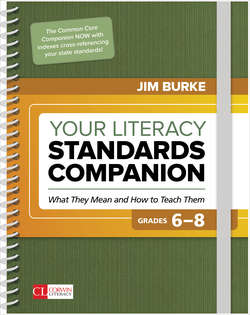Читать книгу Your Literacy Standards Companion, Grades 6-8 - Jim Burke - Страница 67
На сайте Литреса книга снята с продажи.
Common Core Reading Standard 3: Academic Vocabulary: Key Words and Phrases
ОглавлениеActions or events: “Actions” refers to what happens, what people do; in English, it is the actions of characters we study; in history, it is the actions of people who rebel, discover, or invent; in science, it is the actions we must do in the context of a procedure. “Events” are those moments in a story or history or any other field when things change in ways that merit the time we spend studying them (war or social movements).
Characters: Characters can be simple (flat, static) or complex (round, dynamic); only characters who change, who have a rich inner life that interacts with people and their environment could be considered “complex.” This is often represented as an arc—what they are like or where they are when the story begins and when it ends.
Connections: Often it is the unexpected connection the author makes between ideas, events, or characters that leads to the greatest insight for us when reading. We could not anticipate that two elements that seemed so separate could be so linked; this is the epiphany that comes from attention to detail.
Develop and interact: As stories unfold, events and characters change; these changes are the consequence of interactions that take place between people, events, and ideas within a story or an actual social event, such as “the Twitter Revolution” in Iran where events, people, and ideas all resulted in a variety of changes and developments because of multiple interactions between people, events, and ideas like social media. To “develop” is to otherwise change, increasing or decreasing in importance, growing more complex or evolving into something different altogether.
Distinctions: Just as compelling connections reveal important insights, so do distinctions that reveal differences between different people, texts, events, or ideas; often, it is these distinctions that come from close reading that distinguish the reader’s performance, allowing them to show what others missed.
Follow precisely a multistep procedure: The key word here is precisely; for in this context, the word applies to experiments and measurements, both of which rely on accuracy and precision; the other important word is multistep, for any such procedure involves multiple steps that must, in most cases, be followed in some established or imposed order to arrive at the proper result.
Introduced, illustrated, and elaborated: To “introduce” is to provide some background information that establishes the subject, the reason, the meaning, the purpose, the context, or other information we need to know up front. To “illustrate” something is, in the context of reading, to provide examples that show whatever you are writing about; thus, one would provide an example to illustrate what they meant when they said that a social media revolution was “different” from a civil movement, such as the Montgomery bus boycott. To “elaborate” is to give more details, description, or evidence about what they meant when they said that a text was about how an event changed society.
Key steps in the description of a process: Whether in social studies or science, the idea here is that some steps or stages are more crucial in any series of steps or stages than others; students must be able to discern this so they can understand why they are so important and how they affect other people or events.
Performing technical tasks attending to special cases: In a science or technical subjects class, one performs “technical tasks” when they experiment in a lab or with models; those tasks attending to (i.e., dealing with or done as a result of) special cases would be the more complex tasks as a result of their unique conditions that invite exceptions or innovative approaches to solving the problem.
Propel the action: In the 6–8 standards, this is known as “advance the plot.” Every event or detail should move the story ahead in some useful or meaningful way toward its ultimate purpose or resolution. It should make things happen.
